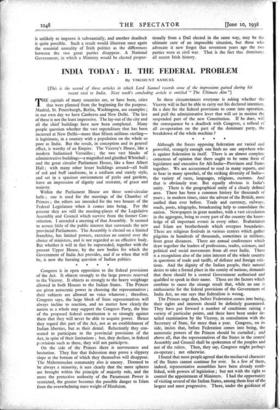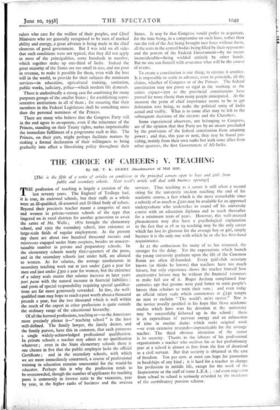Although the forces opposing federation are varied and powerful, strangely
enough one finds no one anywhere who is against federation in itself. There is an almost complete consensus of opinion that there ought to be some form of legislature and executive for All-India—Provinces and States together. We are accustomed to read in many reports, and to hear in many speechis, of the striking diversity of India— the variety of races, languages, religions, customs. And that is obviously true. But equally obvious is India's unity. There is the geographical unity of a clearly defined area. There has been a common history for thousands of years ; in modem times, since the advent of the British, more unified than ever before. Trade and currency, railways, roads, posts, telegraphs, broadcasting help to consolidate the -nation. Newspapers in great number, with a vast circulation in the aggregate, bring to every part of the country the know- ledge of all important events in every other. Brahminism and Islam are brotherhoods which overpass boundaries. There are religious festivals in various centres which gather pilgrims in hundreds of thousands, sometimes in millions, from great distances. There are annual conferences which draw together the leaders of professions, trades, sciences, and political and social movements from all over India. There is a recognition also of the joint interest of the whole country in questions of trade and tariffs, of defence and foreign rela- tions. And the dignity of the Indian people, their natural desire to take a formal place in the comity of nations, demands that there should be a central Government authorised and -qualified to speak in their name. These are the factors which combine to cause the strange result that, while no one is enthusiastic for the federal provisions of the Government of India Act, no one says that federalism is wrong.
The Princes urge that, before Federation comes into being, their rights and interests should be definitely guaranteed. They have put forward a number of conditions raising a variety of particular points, and these have been under de- tailed examination by the Viceroy, in consultation with the Secretary of State, for more than a year. Congress, on its side, insists that, before Federation comes into being, the autocratic powers of the Princes should be curtailed ; and above all, that the representatives of the States in the central Assembly and Council shall be spOkesmen of the peoples and not of the rulers. Then, they say, Congress might perhaps co-operate ; not otherwise.
I found that most people agreed that the mediaeval character of the States cannot continue for ever. In a few of them, indeed, representative assemblies have been already estab- lished, with powers of legislation ; but not with the right to control the appointment of Ministers. I had the opportunity of visiting several of the Indian States, among them four of the largest and most progres. sive. There, under the guidance of rulers who care for the welfare of their peoples, and Chief Ministers who are generally recognised to be men of marked ability and energy, a great advance is being made in the chief elements of good government. But I was told on all sides that such conditions were not typical, that they did not apply in most of the principalities, some hundreds in number, which together make up one-third of India. Indeed the great majority of the States are too small in size, and too poor in revenue, to make it possible for them, even with the best will in the world, to provide for their subjects the minimum services—in education, agricultural training, sanitation, public works, judiciary, police—which modern life demands.
There is undoubtedly a strong case for combining for many purposes groups of the smaller States ; for establishing repre- sentative institutions in all of them ; for ensuring that their members in the Federal Legislature shall be something more than the personal nominees of the Princes.
There are many who believe that the Congress Party will in the end agree to co-operate, even if the reluctance of the Princes, standing on their Treaty rights, makes impracticable the immediate fulfilment of a programme such as this. The Princes, on their part, might perhaps facilitate matters by making a formal declaration of their willingness to bring gradually into effect a liberalising policy throughout their States. It may be that Congress would prefer to acquiesce, for the time being, in a compromise on such lines, rather than run the risk of the Act being brought into force without them, all the seats in the central bodies being filled by their opponents and the powers of the Federal Government—by no means inconsiderable—being wielded entirely by other hands. But no one can foretell with assurance what will be the course of events.
To create a constitution is one thing, to operate it another. It is impossible to settle in advance, even in principle, all the claims, whether of Congress or of the Princes. The federal constitution may not prove so rigid in the working as the critics expect—just as the provincial constitutions have proved far more elastic than many people anticipated. At the moment the point of chief importance seems to be to get federation into being, to make the political unity of India actual and visible. What is to come after may be left to the subsequent decisions of the electors and the Chambers.
Some experienced observers, not belonging to Congress, are of the opinion that that Party are by no means precluded by the provisions of the federal constitution from attaining power ; and that, this year or next, they may be found pro- viding, mainly from their own ranks but with some allies from other quarters, the first Government of All-India.











































 Previous page
Previous page